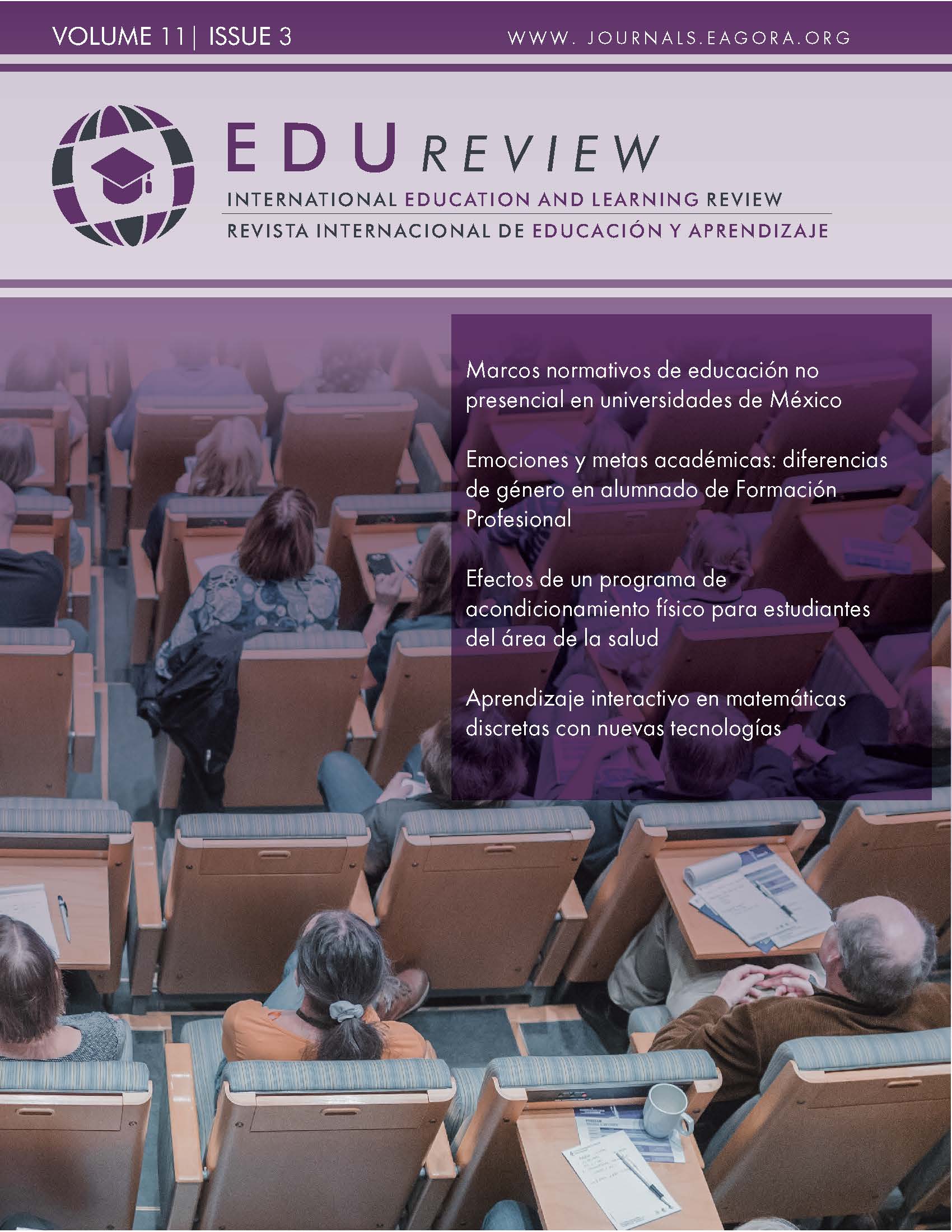Argumentation in Medical Science Education: A Contribution to Educators’ Initial Training
Un aporte a la formación inicial de educadores
DOI:
https://doi.org/10.37467/revedu.v11.5088Keywords:
Argumentation in science, Specific didactics, Medical discourse, Medical education, Critical thinking, Clinical reasoning, Problem Based LearningAbstract
The use of argumentation in science education entails many benefits, including fostering critical skills, promoting the spirit of inquiry, enhancing conceptual understanding and academic performance. This reflection supports the training in argumentation for healthcare professionals, exposing some implicit challenges in medical practice. The relevance of integrating argumentation teaching, clinical reasoning, and problem-based learning is proposed. Although there is no ideal model of universal consultation, constructing arguments to support medical perspectives and engaging in critical dialogues with patients are essential medical skills.
Downloads
Global Statistics ℹ️
|
928
Views
|
197
Downloads
|
|
1125
Total
|
|
References
Calderón, D. (2007). La argumentación en tanto Téchnē: Una vía discursiva para el desarrollo del sujeto social. En A. Gómez, M. Martínez, D. Calderón, O. Corredor, C. Vasco, A. Sáenz-Ludlow, y A. Athanasopoulou, Argumentación y semiótica en la didáctica del lenguaje y las matemáticas. Universidad Distrital Francisco José de Caldas.
Dasgupta, A. (2020). Problem based learning: Its application in Medical Education. J West Bengal Univ Health Sci, 1(2), 11–18.
Elshama, S. S. (2020). How to Apply Problem-Based Learning in Medical Education? A Critical Review. Iberoamerican Journal of Medicine, 2(1), 14–18. https://doi.org/10.5281/ZENODO.3585108 DOI: https://doi.org/10.53986/ibjm.2020.0004
Faize, F. A., Husain, W., y Nisar, F. (2017). A Critical Review of Scientific Argumentation in Science Education. EURASIA Journal of Mathematics, Science and Technology Education, 14(1). https://doi.org/10.12973/ejmste/80353 DOI: https://doi.org/10.12973/ejmste/80353
García, G. (2016). Aprendizaje basado en problemas y argumentación, herramientas para promover cambios en los modelos explicativos sobre el infarto agudo del miocardio [Maestría en Educación]. Universidad Tecnológica de Pereira.
García, G., y Ruiz, F. (2021a). Clinical reasoning and medical education: Scoping Review. Educación Médica, 22(2), 106–110. https://doi.org/10.1016/j.edumed.2020.11.015 DOI: https://doi.org/10.1016/j.edumed.2020.11.015
García, G., y Ruiz, F. (2021b). Tendencias sobre argumentación clínica desde un enfoque multimodal. Tecné, Episteme y Didaxis: TED, Número Extraordinario, 3047–3052.
Gómez, A. (1991). El primado de la razón práctica. Universidad del Valle.
Gormaz, C., y Brailovsky, C. (2012). Desarrollo del Razonamiento Clínico en Medicina. REDU Revista de Docencia Universitaria, 10, 177–199. DOI: https://doi.org/10.4995/redu.2012.6128
Ju, H., Choi, I., y Yoon, B. Y. (2017). Do medical students generate sound arguments during small group discussions in problem-based learning?: An analysis of preclinical medical students’ argumentation according to a framework of hypothetico-deductive reasoning. Korean Journal of Medical Education, 29(2), 101–109. https://doi.org/10.3946/kjme.2017.57 DOI: https://doi.org/10.3946/kjme.2017.57
Kinnear, B., Schumacher, D. J., Driessen, E. W., y Varpio, L. (2022). How argumentation theory can inform assessment validity: A critical review. Medical Education, 56(11), 1064–1075. https://doi.org/10.1111/medu.14882 DOI: https://doi.org/10.1111/medu.14882
López, M., Gómez, A., López, M., y Gómez, A. (2020). El razonamiento clínico con enfoque didáctico. InterCambios. Dilemas y transiciones de la Educación Superior, 7(2), 16–25. https://ojs.intercambios.cse.udelar.edu.uy/index.php/ic/article/download/274/214/
Osborne, J. (2009). Hacia una pedagogía más social en la educación científica: El papel de la argumentación. Educación Química, 20(2), 156–165. https://doi.org/10.1016/S0187-893X(18)30022-3 DOI: https://doi.org/10.1016/S0187-893X(18)30022-3
Perelman, C., y Olbrechts-Tyteca, L. (1989). Los límites de la argumentación. En Tratado de la argumentación: La nueva retórica. Gredos.
Rodríguez de Castro, F., Carrillo-Díaz, T., Freixinet-Gilart, J., y Julià-Serdà, G. (2017). Razonamiento clínico. FEM: Revista de la Fundación Educación Médica, 20(4), 149–160. https://doi.org/10.33588/fem.204.903 DOI: https://doi.org/10.33588/fem.204.903
Rubinelli, S., y Zanini, C. (2012). Teaching argumentation theory to doctors: Why and what. Journal of Argumentation in Context, 1(1), 66–80. https://doi.org/10.1075/jaic.1.1.06rub DOI: https://doi.org/10.1075/jaic.1.1.06rub
Toulmin, S. (1958). The uses of argument. Universidad de Cambridge.
Trullàs, J. C., Blay, C., Sarri, E., y Pujol, R. (2022). Effectiveness of problem-based learning methodology in undergraduate medical education: A scoping review. BMC Medical Education, 22(1), 104. https://doi.org/10.1186/s12909-022-03154-8 DOI: https://doi.org/10.1186/s12909-022-03154-8
van Eemeren, F., y Grootendorst, R. (2002). Argumentación, comunicación y falacias: Una perspectiva pragma-dialéctica. Universidad Católica de Chile.
Villada, C., y Ruiz, F. (2018). La Argumentación Multimodal en la Enseñanza de las Ciencias, un aporte a la Formación Inicial de Docentes. Tecné, Episteme y Didaxis: TED, Extraordin. https://revistas.pedagogica.edu.co/index.php/TED/article/view/8895
Villarroel, J., Ribeiro, Q., y Bernal, N. (2014). Razonamiento clínico: Su déficit actual y la importancia del aprendizaje de un método durante la formación de la competencia clínica del futuro médico. Revista Científica Ciencia Médica, 17, 29–36.
Zapata-Ospina, J. P., y Zamudio-Burbano, M. A. (2021). Razonamiento clínico en medicina I: Un recorrido histórico. Iatreia, 34(3), Article 3. https://revistas.udea.edu.co/index.php/iatreia/article/view/343200
Downloads
Published
How to Cite
Issue
Section
License
Those authors who publish in this journal accept the following terms:
-
Authors retain copyright.
-
Authors transfer to the journal the right of first publication. The journal also owns the publishing rights.
-
All published contents are governed by an Attribution-NoDerivatives 4.0 International License.
Access the informative version and legal text of the license. By virtue of this, third parties are allowed to use what is published as long as they mention the authorship of the work and the first publication in this journal. If you transform the material, you may not distribute the modified work. -
Authors may make other independent and additional contractual arrangements for non-exclusive distribution of the version of the article published in this journal (e.g., inclusion in an institutional repository or publication in a book) as long as they clearly indicate that the work was first published in this journal.
- Authors are allowed and recommended to publish their work on the Internet (for example on institutional and personal websites), following the publication of, and referencing the journal, as this could lead to constructive exchanges and a more extensive and quick circulation of published works (see The Effect of Open Access).













